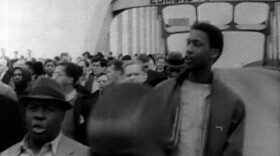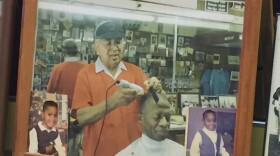If you'd like to hear more of Alabama Public Radio's international award winning coverage of the civil rights movement, click at the bottom of the page. Pat D.
Let’s put you in the position of a being black person living in the South during the Civil Rights Movement.
“If you picked up a white newspaper you as a black person didn’t exist,” says Craig Flournoy.
Flournoy is a Pulitzer Prize winning journalist and professor of journalism at Southern Methodist University.
“There was no record of you being born, no record of you graduating from high school much less college, no record of you getting married, no record of your promotion and no record of you dying,” he says.
In other words, unless you were famous like Joe Louis or Louis Armstrong, a black person might not make it into most white newspapers unless they committed a crime. So when it came to coverage of events surrounding the Civil Rights Movement, there was little if any coverage at all. Take the Montgomery Bus Boycott as an example.
“The New York Times basically missed the story,” says Flournoy. “They relied on wire service copy for the first four months and the esteemed Johnny Popham, the greatest reporter covering the south during this time wrote exactly two stories about it. And the way they framed the story, the story they saw was a legal contest once the NAACP came in and filed a lawsuit.”
While Dr. Martin Luther King, Jr. felt that the church pews across the nation remained among the most segregated places in America, Flournoy says the nation's newsrooms weren't much better.
“I do believe in fairness meaning you get both sides of a story and on that basis white newspapers failed abysmally,” he believes. “They almost never covered the black side of a story.”
That was left to black newspapers, often at great risk to the reporters. One of the unsung newsmen of the Civil Rights Era was Emory Jackson. Jackson edited the Birmingham World which served as a lifeline to blacks about what was going on around the state and world.
“You had other black newspapers here some would be around for a year, some would be around for a few years but the World was around for decades,” says Jim Baggett, an archivist at the Birmingham Public Library.
The library is now home to the newspaper’s archives and a collection of Jackson’s personal papers.
“And with Emory Jackson who always fought with the papers owners in Atlanta to have as much local content in the paper as possible it’s really an indispensable record in terms of documenting African-American life in Birmingham during that period,” says Baggett.
And not just a record of big events like the Montgomery Bus Boycott. Jackson’s coverage of that pivotal incident is considered some of the best around. Baggett says even earlier moments in the Civil Rights movement such as the 1948 Freedom Train visit made black papers.
“The Freedom Train was sponsored by the American Heritage Foundation it was traveling the country stopping in cities,” says Baggett. “People could go onto the train; you could see the Emancipation Proclamation a copy of the Declaration of Independence all these important documents from history.”
But in many southern cities, lines to get on the train to see the documents were segregated. That didn’t sit well with Jackson.
“Jackson was one of the people who first raised the issue and really led the fight here in Birmingham to not have Jim Crow lines outside the Freedom Train,” says Baggett. “Jackson said we shouldn’t have to stand in a segregated line to see the Emancipation Proclamation.”
It was this type of reporting that contributed to Jackson’s fearless reputation. He would take on Bull Connor and other segregation minded officials in his articles, print full names of those he interviewed and always tried to get both sides of the story. But this also invited danger for the intrepid newsman. Joe Dixon who worked with Jackson and later bought the Birmingham World remembers one instance where Jackson went to cover the Dixiecrat convention in 1948 in Birmingham.
“And they told him that he couldn’t participate,” says Dixon. “He told them he was with the press representing the journalists and he had just as much right to be there as anybody else. They threw him out.”
The Dixiecrat party was a segregationist faction of the Democratic Party that split off because they were unhappy with President Harry Truman and their own party’s national plank calling for civil rights. They certainly didn’t want a black journalist especially one of Jackson’s tenacity covering their event.
“Emory went back and they put him out again and told him to run,” says Dixon. “But he didn’t run and I asked him, ‘Why didn’t you run’ and he said ‘If I had run they would have shot me saying I was running around trying to steal stuff.’”
Jackson would go on to cover many of the significant events in Alabama during the Civil Rights Movement from the Children’s March to the Stand in the Schoolhouse Door. Always a believer in justice and going through the courts Jackson would later find himself on the wrong side of the demonstrations brought on by Fred Shuttlesworth and Martin Luther King Jr.
“He was bothered by street protests,” says Jim Baggett. “He called the demonstrations here a flash dance. He didn’t believe it would work and he didn’t believe it was the best approach in terms of trying to bring about change.”
The Birmingham World is long gone and all that remains is a plaque dedicated to Emory Jackson outside of Nelson Brothers Café which sits near the World’s old headquarters. Partially due to his differences on the Birmingham Campaign, Jackson’s impact on Birmingham gets overlooked today. Joe Dixon, who helped get the plaque dedicated to Jackson, feels Emory has been unfairly remembered by history.
“The sad thing about all of this is the treatment that the community has given Emory since he passed,” says Dixon.” “Three people that I don’t think really was covered: Emory Jackson, Jesse Walker, Fred Shuttlesworth. They never got what they should’ve gotten.”
Fred Shuttlesworth and Martin Luther King Jr. may rightfully be credited as being great Civil Rights leaders, but without people like Emory Jackson their role in history might be drastically changed. Tune in for Ryan’s Vasquez complete story Thursday during “Morning Edition” and “All Things Considered” on Alabama Public Radio.



















